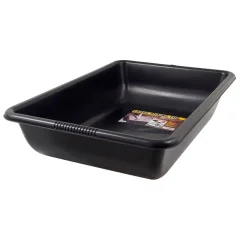Choice of parts cleaner solvents is a real issue today. For many years I used Stoddard solvent bought in bulk from a local petroleum supply house. A while back the price of solvent went out of sight, and I looked around for alternatives. It seems that generic paint thinner, mineral spirits, and Stoddard solvent are pretty much the same stuff, at least for parts cleaning purposes, so I shopped for whichever was cheaper. Recently, after reading some suggestions on the internet, I tried a 50/50 mix of mineral spirits and diesel fuel. It works quite well, but does not dry quite as effectively as straight solvent. I think it might require a bit more scrubbing to get parts clean, but it is certainly cheaper. Still, when it is time to replace the fluid, I think I'll go back to straight solvent. I use a Harbor Freight parts washer that holds slightly over 10 gallons. Over the years I've replaced the original pump with one designed for solvent, and added a spin-on automotive filter in line.
I've been looking at the water-based parts cleaners, reasonably available around here on the used market. The big problem with them for me is that they only work well if you keep the solution heated. For a part time user like me, leaving them on all the time runs up the electric bill significantly. I might still give it a try, but only heat it when I expect to be doing a lot of parts cleaning.
Way back when I first started working on cars in the late '50s, I cleaned parts in gasoline. I quit doing that after finding that it dried out my hands so much that the skin cracked and bled! That was before you could buy large packs of latex gloves for cheap at Harbor Freight. I still don't think cleaning parts in gas is a good idea. It's still much more flammable than cleaning solvents, and packed with all kinds of nasty chemical compounds.
Ken

